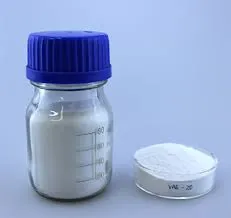
Nov . 14, 2024 11:16 Back to list
hpmc meaning
Understanding HPMC A Multifaceted Compound in Modern Applications
Hydroxypropyl Methylcellulose (HPMC) is a versatile compound that has become increasingly prominent across various industries due to its unique properties and functionalities. As a semi-synthetic polymer derived from cellulose, HPMC is primarily recognized for its use as a thickener, emulsifier, and film-forming agent. Its various applications span from pharmaceuticals to food preparation, making it an essential ingredient in modern manufacturing processes.
The Chemical Composition of HPMC
HPMC is created through the etherification of cellulose, a natural polymer sourced from plant cell walls. The modification process involves substituting hydroxyl groups in cellulose with hydroxypropyl and methyl groups. This alteration significantly enhances the solubility and stability of the compound in different environments. The degree of substitution of these groups can be tailored, resulting in a range of HPMC products with varying properties suited for specific applications.
Pharmaceutical Applications
In the pharmaceutical industry, HPMC is widely utilized as a binder in tablet formulations. Due to its favorable gel-forming properties, it facilitates the controlled release of active pharmaceutical ingredients, making it invaluable in developing sustained-release medications. Furthermore, HPMC is used in the production of capsules and as a stabilizer in suspensions and emulsions, enhancing the potency and effectiveness of various therapeutic drugs.
Another significant aspect of HPMC in pharmaceuticals is its role in ophthalmic solutions. It acts as a lubricant in eye drops, providing relief for dry eyes. Its ability to retain moisture means that products containing HPMC can offer prolonged hydration, contributing to improved patient comfort.
hpmc meaning

Food Industry Utilization
In the food industry, HPMC serves as a food additive, recognized for its ability to improve texture, stability, and moisture retention in various products. It is commonly found in ice creams, sauces, and baked goods, where it contributes to the creaminess and mouthfeel of food items. Additionally, the compound is valued for its emulsifying properties, facilitating the mixture of oil and water in processed foods. As a vegetarian alternative to gelatin, HPMC is also used in vegan food products, widening its acceptability among consumers looking for plant-based options.
Construction and Cosmetics
Beyond pharmaceuticals and food, HPMC's applications extend to construction and cosmetics. In the construction sector, HPMC is used as an additive in cement and plaster, enhancing workability and water-retention properties. This results in improved adhesion and reduces the likelihood of cracking in finished structures.
In the cosmetics industry, HPMC is employed as a thickening agent in lotions, creams, and shampoos. Its ability to stabilize emulsions is key in creating smooth, consistent formulations that enhance the consumer experience.
Conclusion
The utility of Hydroxypropyl Methylcellulose is vast and varied, making it an indispensable component in contemporary applications. From enhancing the efficiency of pharmaceutical products to improving the texture of food items and contributing to the quality of construction materials, HPMC showcases its versatile nature and importance across multiple sectors. As industries continue to innovate, the reliance on such multifunctional compounds is likely to grow, solidifying HPMC's role in shaping modern manufacturing and product development. Embracing this compound not only addresses functional needs but also meets the demand for safe, effective, and sustainable solutions in our evolving world.
-
Versatile Hpmc Uses in Different Industries
NewsJun.19,2025
-
Redispersible Powder's Role in Enhancing Durability of Construction Products
NewsJun.19,2025
-
Hydroxyethyl Cellulose Applications Driving Green Industrial Processes
NewsJun.19,2025
-
Exploring Different Redispersible Polymer Powder
NewsJun.19,2025
-
Choosing the Right Mortar Bonding Agent
NewsJun.19,2025
-
Applications and Significance of China Hpmc in Modern Industries
NewsJun.19,2025







